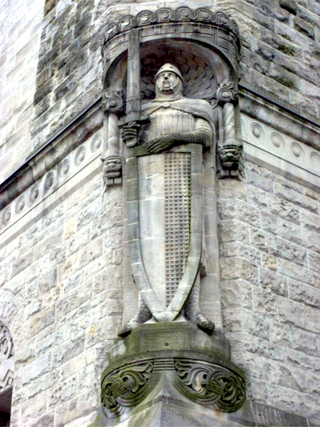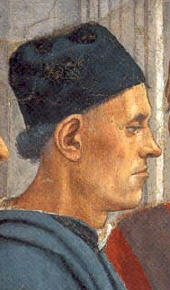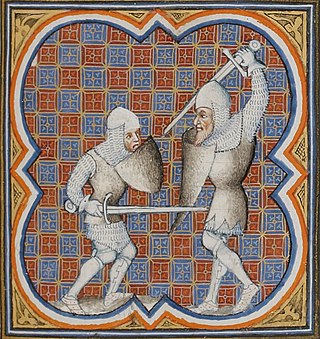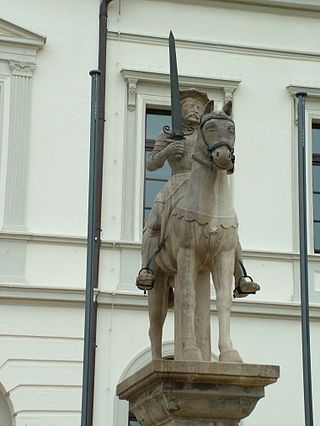Related Research Articles

Roland was a Frankish military leader under Charlemagne who became one of the principal figures in the literary cycle known as the Matter of France. The historical Roland was military governor of the Breton March, responsible for defending Francia's frontier against the Bretons. His only historical attestation is in Einhard's Vita Karoli Magni, which notes he was part of the Frankish rearguard killed in retribution by the Basques in Iberia at the Battle of Roncevaux Pass.

Orlando furioso is an Italian epic poem by Ludovico Ariosto which has exerted a wide influence on later culture. The earliest version appeared in 1516, although the poem was not published in its complete form until 1532. Orlando furioso is a continuation of Matteo Maria Boiardo's unfinished romance Orlando innamorato. In its historical setting and characters, it shares some features with the Old French La Chanson de Roland of the eleventh century, which tells of the death of Roland. The story is also a chivalric romance which stemmed from a tradition beginning in the late Middle Ages and continuing in popularity in the 16th century and well into the 17th.

The Song of Roland is an 11th-century chanson de geste based on the deeds of the Frankish military leader Roland at the Battle of Roncevaux Pass in AD 778, during the reign of the Emperor Charlemagne. It is the oldest surviving major work of French literature. It exists in various manuscript versions, which testify to its enormous and enduring popularity in Medieval and Renaissance literature from the 12th to 16th centuries.

Renaudde Montauban was a legendary hero and knight which appeared in a 12th-century Old French chanson de geste known as The Four Sons of Aymon. The four sons of Duke Aymon are Renaud, Richard, Alard and Guiscard, and their cousin is the magician Maugris. Renaud possesses the magical horse Bayard and the sword Froberge.

The Battle of Roncevaux Pass in 778 saw a large force of Basques ambush a part of Charlemagne's army in Roncevaux Pass, a high mountain pass in the Pyrenees on the present border between France and Spain, after his invasion of the Iberian Peninsula.

Luigi Pulci was an Italian diplomat and poet best known for his Morgante, an epic and parodistic poem about a giant who is converted to Christianity by Orlando and follows the knight in many adventures.

In the 11th century Matter of France, Ganelon is the knight who betrayed Charlemagne's army to the Saracens, leading to the 778 Battle of Roncevaux Pass. His name is said to derive from the Italian word inganno, meaning fraud or deception. He is based upon the historical Wenilo, the archbishop of Sens who betrayed King Charles the Bald in 858.

Maugris or Maugis was one of the heroes of the chansons de geste and romances of chivalry and the Matter of France that tell of the legendary court of King Charlemagne. Maugis was cousin to Renaud de Montauban and his brothers, son of Beuves of Aygremont and brother to Vivien de Monbranc. He was brought up by Oriande the fairy, and became a great enchanter. He won the magical horse Bayard and the sword Froberge which he later gave to Renaud.

Oliver, sometimes referred to as Olivier de Vienne or de Gennes, is a legendary knight in the Matter of France chansons de geste, especially the French epic The Song of Roland. In the tradition, he was Roland's closest friend, advisor, confidant and brother-in-law to be, one of Charlemagne's twelve peers and brother of Aude, Roland's betrothed. He dies with Roland at the Battle of Roncevaux Pass. Some critics have linked his name to the olive tree, a biblical symbol of divine wisdom.

Fierabras or Ferumbras is a fictional Saracen knight appearing in several chansons de geste and other material relating to the Matter of France. He is the son of Balan, king of Spain, and is frequently shown in conflict with Roland and the Twelve Peers, especially Oliver, whose prowess he almost rivals. Fierabras eventually converts to Christianity and fights for Charlemagne.

Ferragut was a character—a Saracen paladin, sometimes depicted as a giant—in texts dealing with the Matter of France, including the Historia Caroli Magni, and Italian epics, such as Orlando Innamorato by Matteo Maria Boiardo and Orlando Furioso by Ludovico Ariosto. In the tales, he was portrayed as physically invulnerable except at his navel/stomach, and was eventually killed by the paladin Roland.

The Historia Caroli Magni, also known as the Historia Karoli Magni et Rotholandi or the (Pseudo-)Turpin Chronicle, is a 12th-century Latin chronicle consisting of legendary material about Charlemagne's campaigns in Spain. The chronicle states it was written by Charlemagne's contemporary Turpin, Archbishop of Reims, but it was found out as a medieval forgery. The work was extremely popular, and served as a major source of material on Charlemagne in chronicles, fiction and iconography throughout Medieval Europe. The miracles of the flowering lances and the death of Ferracutus appear on the windows of Chartres cathedral.

Morgante is an Italian romantic epic by Luigi Pulci which appeared in its final form in 1483; a now-lost 23-canto version likely appeared in late 1478; two other 23-canto versions were published in 1481 and 1482. The work was commissioned by Lucrezia Tornabuoni.
Pinabel, also known as Pinabello, is one of Charlemagne's vassals in The Song of Roland, Orlando furioso, and other works within the corpus of writings known as the Matter of France. Pinabel is the nephew and friend of the knight Ganelon. Different works give different accounts Orlando furioso, Pinabel tricks the female knight Bradamante into stepping off a cliff, but she narrowly escapes death. She later kills Pinabel for his treachery. In the Old French chanson de geste The Song of Roland, Pinabel represents his friend Ganelon, who has been charged with treason, in a trial by combat. In the course of this duel, Pinabel is killed by Thierry, another of Charlemagne's knights.

The Paladins, also called the Twelve Peers, are twelve legendary knights, the foremost members of Charlemagne's court in the 8th century. They first appear in the medieval chanson de geste cycle of the Matter of France, where they play a similar role to the Knights of the Round Table in Arthurian romance. In these romantic portrayals, the chivalric paladins represent Christianity against a Saracen (Muslim) invasion of Europe. The names of the paladins vary between sources, but there are always twelve of them led by Roland. The paladins' most influential appearance is in The Song of Roland, written between 1050 and 1115, which narrates the heroic death of Roland at the Battle of Roncevaux Pass.
Andrea Mangiabotti, called Andrea da Barberino, was an Italian writer and cantastorie ("storyteller") of the Quattrocento Renaissance. He was born in Barberino Val d'Elsa, near Florence, and lived in Florence. He is principally known for his prose romance epic Il Guerrin Meschino, his I Reali di Francia, a prose compilation of the Matter of France epic material concerning Charlemagne and Roland (Orlandino) from various legends and chansons de geste, and for his Aspramonte, a reworking of the chanson de geste Aspremont, which also features the hero Ruggiero. Many of his writings probably derive from Franco-Italian works, such as the Geste Francor, that includes versions of the stories of Reali di Francia and dates to the first half of the fourteenth century. His works, which circulated at first in manuscript, were extremely successful and popular, and were a key source of material for later Italian romance writers, such as Luigi Pulci (Morgante), Matteo Maria Boiardo and Ludovico Ariosto.
Agolant or Agolante is a fictional character in Medieval and Renaissance romantic epics dealing with the Matter of France, including Orlando innamorato by Matteo Maria Boiardo and Orlando furioso by Ludovico Ariosto. He is a Saracen king from Africa.

Veillantif (French), Vielantiu ; Vegliantin, Vegliantino or Brigliadoro (Italian) is the name of Roland the paladin's trustworthy and swift steed in the stories derived from the chansons de geste. The French name comes from an expression meaning "vigilant". Veillantif is first mentioned in The Song of Roland.
John Herman Merivale was an English barrister and man of letters.

Entrée d'Espagne or L'Entrée d'Espagne or Entrée en Espagne is a 14th-century (c.1320) Franco-Venetian chanson de geste. The author is thought to be from Padua. The work has survived in only one manuscript, today in the Biblioteca Marciana in Venice. Based on material from the Pseudo-Turpin Chronicle and several other sources, the epic poem tells of Charlemagne's battles in Spain and the adventures of the paladin Roland.
References
- 1 2 3 Peter Brand and Lino Pertile, eds. The Cambridge History of Italian Literature. Cambridge: 1996; revised edition: 1999, p.169. ISBN 0-521-66622-8
- 1 2 3 Luigi Pulci: Morgante: The Epic Adventures of Orlando and His Giant Friend, a complete English translation by Joseph Tusiani. Introduction and notes by Edoardo Lèbano (Indiana University Press, 1998). ISBN 0-253-21407-6, notes, p. 765 and p. 890.
- ↑ Jessie Crosland. The Old French Epic. New York: Haskell House, 1951, 261–2.